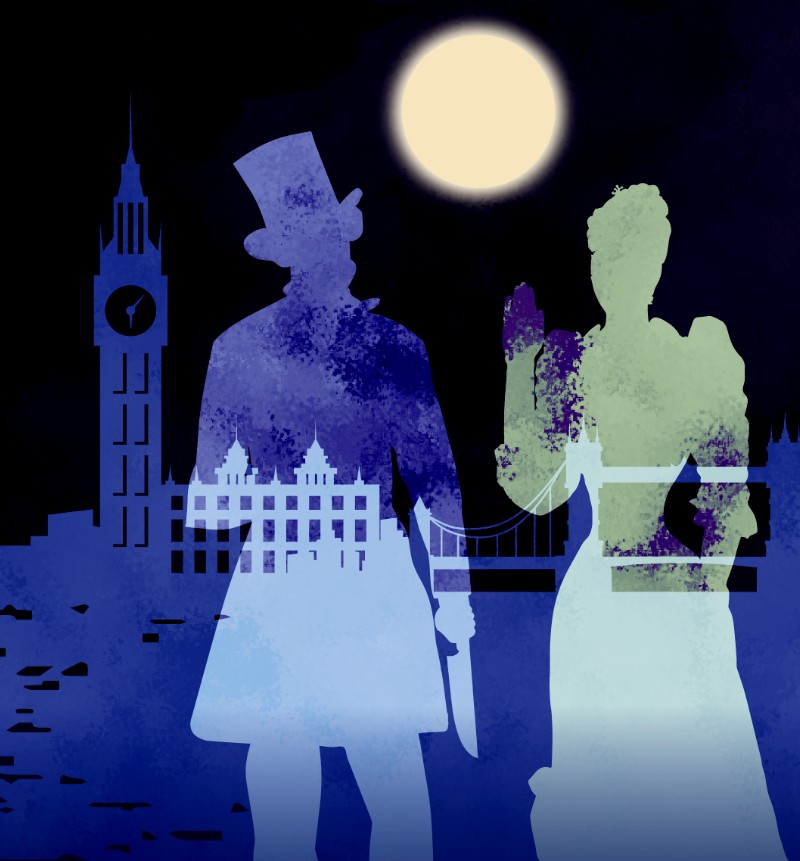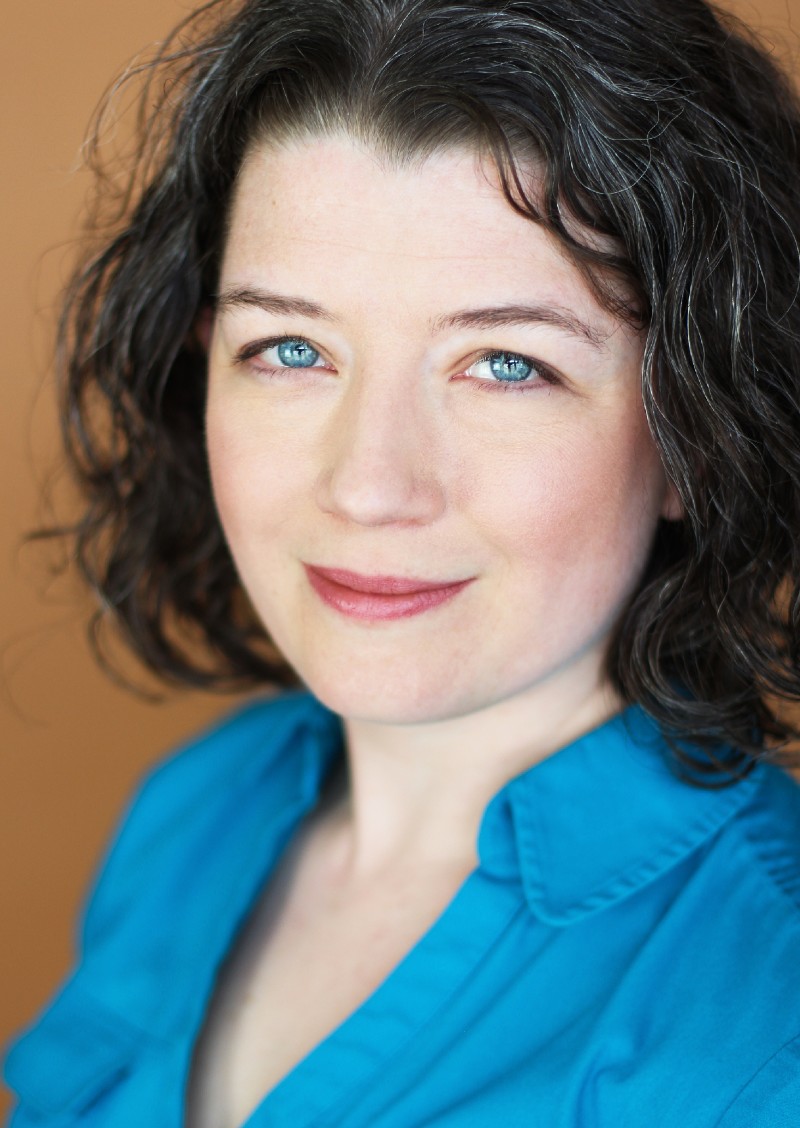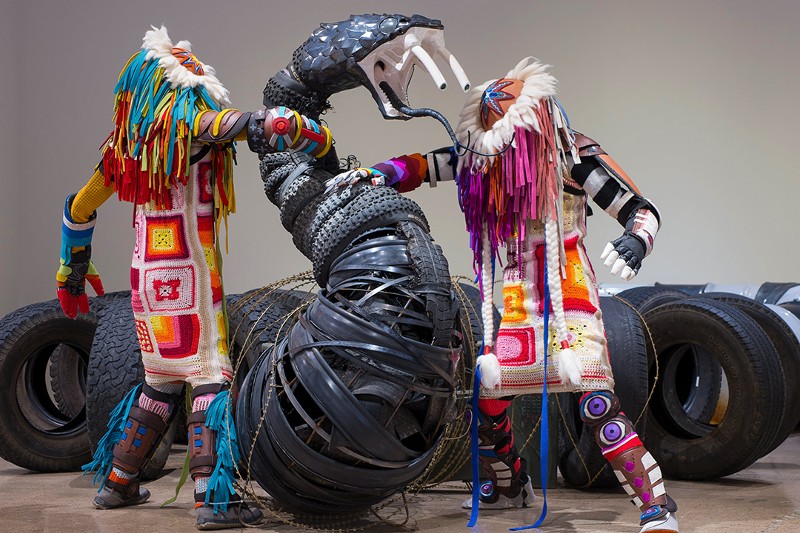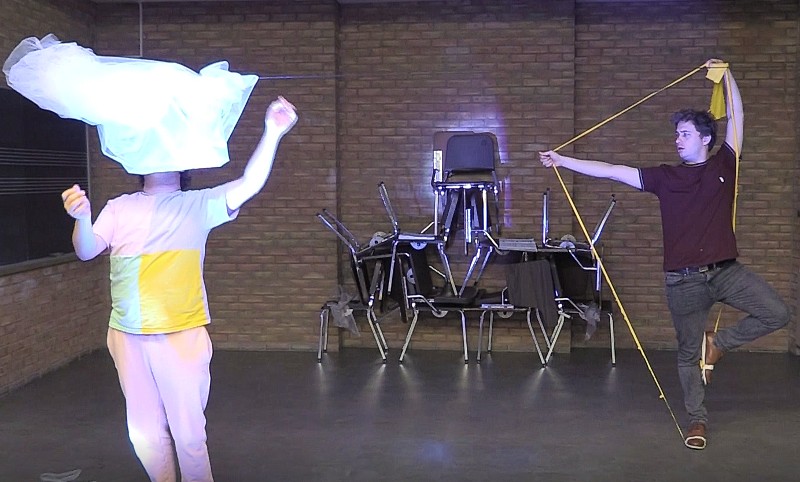A Devilish New Comedy: David MacGregor's "The Antichrist Cometh" debuts at The Purple Rose Theatre

David MacGregor's plays have been performed in 15 countries, including India, Israel, South Korea, and Tasmania.
But the Michigan-born artist develops most of his world premieres right here at home.
Among the works the resident playwright for The Purple Rose Theatre Company debuted on the Chelsea stage are his Sherlock Holmes trilogy, Vino Veritas, Gravity, Consider the Oyster, The Late Great Henry Boyle, and his latest play, the hilarious The Antichrist Cometh, which begins previews there on March 22 and opens March 29.
John, an advertising exec, hasn’t seen Duncan, his old college roommate, for years. John and his wife, Lili, have Duncan and his fiancée, Fiona, for dinner. Fiona is devoutly religious and notices things that bring her to a startling conclusion:
John is the Antichrist!
“The basic idea for this play occurred to me a long time ago," MacGregor says. "I’m not personally religious, but I’ve read the Bible and Koran because they’re such important and influential texts. The Book of Revelations says the Antichrist will arrive on Earth."
MacGregor named his protagonist John, referencing the Book of John and the letters of John, but says, “John is a regular everyday guy who gradually realizes he might be the Antichrist.”
Through the Grisly Maze: "Elizabeth Cree" is a puzzle-filled operatic mystery

As the opera begins, Elizabeth is hung for the murder of her husband, the playwright John Cree.
Is she guilty of poisoning him?
John is a serial killer, in the fashion of Jack the Ripper.
Or is he?
You’ll have about an hour and a half to solve the puzzles in Elizabeth Cree, which unravel in 29 scenes and over four timelines and include plays and vaudeville within an opera.
“It’s an interesting and complicated piece,” says Gregory Keller, who directs Unversity of Michigan opera students in this one-act chamber opera, sung in English, that runs March 21-24 at the Lydia Mendelssohn Theatre. Likening it to a hedge maze, he says, “We’re presenting it as a theatrical puzzle, a house of mirrors that the audience gets lost in and, maybe, found in. Each time you go into the maze, you make another connection.”
It’s so much so that conductor Kirk A. Severtson, who coordinates opera at U-M, says audiences who see it twice will delight in discovering Easter eggs, once they know what happened. “You have to see it more than once to get all the nuances,” he says.
But those who see it once will have a chance to figure out just what is happening, after observing three gruesome murders almost in front of their eyes: Keller opted to stylize the crimes, presenting them as Victorian shadow plays.
U-M law professor Barbara McQuade fights against disinformation in her new book

When Barbara McQuade, a University of Michigan law professor and MSNBC legal analyst, prosecuted a doctor who “cured” cancer in patients who didn’t have cancer, some victims refused to believe they’d been duped. They had trusted their doctor, after all, and how could they have been so wrong?
In her new book, Attack From Within: How Disinformation Is Sabotaging America, which she will discuss at the Ann Arbor District Library on March 7, McQuade uses many examples from history, here and abroad, to show us just how disinformation works.
In her comprehensive page-turner, McQuade also pulls theories from top political scientists, stories from FBI agents and other experts, and even Greek mythology, weaving them into a coherent argument that just may save our democracy.
A Jill of All Trades: Julia Garlotte takes the helm of The Penny Seats Theatre Company

A theater's artistic director has to oversee everything on stage. She also has to check in with financial managers so the production stays on budget, and she has to understand acting, directing, and design—the whole deal.
Julia Garlotte, the new artistic director (AD) of The Penny Seats Theatre Company, is the whole deal.
Garlotte has acted for The Purple Rose in Chelsea, The Encore Musical Theatre Company in Dexter, and Penny Seats in Ann Arbor as well as at some of the town's lost theaters: The Performance Network, The Blackbird, and The New Theatre Project. Audiences have seen her at other theaters throughout Southeast and Central Michigan, too.
She has also designed sound for several theaters, recorded audiobooks, and recently she’s been directing.
Oh, and Garlotte managed the box office at The Purple Rose for 12 years.
The “sheer volume of her professional experiences” is one of the things that impresses Penny Seat’s outgoing AD, Joseph Zettelmaier.
In addition to working with Penny Seats as an actor, she's also been a sound designer, sound engineer, assistant director, and director for the company.
Insulation Versus Isolation: U-M's production of “Arbor Falls” holds a mirror to society's divisions

Caridad Svich’s play Arbor Falls is set in a small, landlocked, tree-lined town of that name. We know little about the town, save that it is near another place where something terrible happened, and the people of Arbor Falls want to feel safe. We know, too, that it is home to a church with a dwindling congregation and a preacher unsure of his faith.
In one scene, the preacher says they don’t think about what to say in their sermon but what to leave out. In this play, much is left out, too. Only one character is named other than by title (Preacher, Lover, Owner), and none have specific genders; pronouns are gender neutral. The dialogue—short lyrical lines, lacking in detail—also leaves a lot for the actors and director to imagine.
Into Arbor Falls comes a stranger, a traveler nobody knows, who makes “odd” sounds when praying. Preacher offers them safe harbor and food. But who is this stranger? Can they be accepted here?
“I’ve been really excited about the way the cast and production team have embraced the project,” says Tiffany Trent, chair of the University of Michigan’s Department of Theatre and Drama and director of Arbor Falls, which makes Michigan premiere on February 15 at Lydia Mendelssohn Theatre.
For Trent, a major theme is insulation versus isolation.
Creative Visions: Theater set designer Jungah Han conjures new worlds from scratch

Jungah Han doesn’t try to copy a successful look from a previous production of a play, musical, or opera she is designing. She doesn’t look at photos or read about what other designers have done, and she tells her University of Michigan students to begin without preconceptions, too.
At times—more often when she’s designing in the United States than abroad—she’s been asked to reproduce what’s been done in other productions.
She’s not interested in those jobs.
Han, who joined the faculty at the U-M School of Music, Theatre, and Dance last fall, is a theater artist. She brings her own response to a play, in collaboration with the director’s vision and those of others on the design team.
Yet, Han didn’t even know what theater was when she enrolled in Kangwon National University in her native South Korea. There, she studied business. “Part of business is marketing and advertising. I was interested in the design part,” recalls Han, who moved to Honolulu to study desktop publishing at Hawaii Pacific University.
Then, a tidal change.
UMMA's "Arts & Resistance" exhibits look at the role of creative works in fighting for cultural change

Artists resist.
They share unique visions, even those that run counter to cultural norms. And they resist attempts to shut down museums, to cancel productions of plays, to ban books.
Artists also resist death by creating work they hope will outlive them. Shakespeare knew: “Not marble, nor the gilded monuments of princes shall outlive this powerful rhyme."
For the fall semester, the University of Michigan is exploring ways artists resist social ills and injustices with Arts & Resistance, a campus-wide partnership between departments and galleries organized by the University of Michigan Museum of Art (UMMA) and the U-M Arts Initiative.
UMMA's three exhibits for Arts & Resistance document a history of wrongs that include slavery, appropriation of Native American land, and systemic racism.
Dress for Success: Costume designer Suzanne Young clothes actors for local, national, and international theater productions

It was 1981 when Suzanne Young, 21, moved to Boston from her native England.
“It was a bit of a culture shock,” she recalls. “Police came to the costume rental shop for Santa costumes. I wasn’t used to seeing people with guns on their hips or to hearing people tell me how much they loved my accent.”
She’s gotten used to this side of the pond, settling with her husband, Larry, in Dixboro, a village just outside Ann Arbor, and became a go-to costume designer for area theaters including the University of Michigan, Purple Rose, Wild Swan, Performance Network, and more.
The Youngs found their way here circuitously, with time spent in Europe and different states. But wherever they went, Suzanne created opportunities to work—from opening a school to teach English to French children to developing a wedding gown company.
Golden Years: Purple Rose Theatre's "Jukebox for the Algonquin" focuses on seniors living and loving

Billed as “a serious comedy about sex, drugs, and rocking chairs,” Paul Stroili’s Jukebox for the Algonquin transpires at Placid Pines, a senior living community in the Adirondack region of New York, circa 2003.
This Purple Rose Theatre Company world premiere, which runs July 7-September 2, features characters who hail from the boroughs of New York City. They now find themselves removed from their usual surroundings and the people they loved, but they are ready to accept new challenges—even to create them.
Audiences may recognize playwright Stroili from his first-rate performances on the Rose stage—God of Carnage, Welcome to Paradise, and Watson in David MacGregor’s Sherlock Holmes series—or from TV appearances on Empire, Chicago P.D., Undercover Bridesmaid, and more.
Stroili says his venture into playwriting was “born of adversity.” He was booking roles in Los Angeles only sporadically and decided to write something for himself. Straight Up With a Twist enjoyed more than 1,000 performances nationwide and culminated in a twice-extended Off-Broadway run.
Take a Leap: Fifth Wall's new abstract chamber-rock opera "The Precipice" debuts at Riverside Arts in Ypsilanti

Our lives are not static.
We go through changes, we ask questions.
What does leaving home involve? What's it like to move on from relationships? What does any life change entail?
Fifth Wall Performing Arts, a multidisciplinary troupe that does experimental musical theater, tackles questions like these in Karl Ronneburg‘s The Precipice.
Karl, who uses only his first name professionally, created a collage, woven from journal entries, poems, letters to friends, music, and voice memos—his own and those of Grey Rose Grant—to create the abstract chamber-rock opera.
Audiences at Riverside Arts in Ypsilanti on April 29 and 30 will witness the world premiere of The Precipice before the company brings the piece to New York City.


































